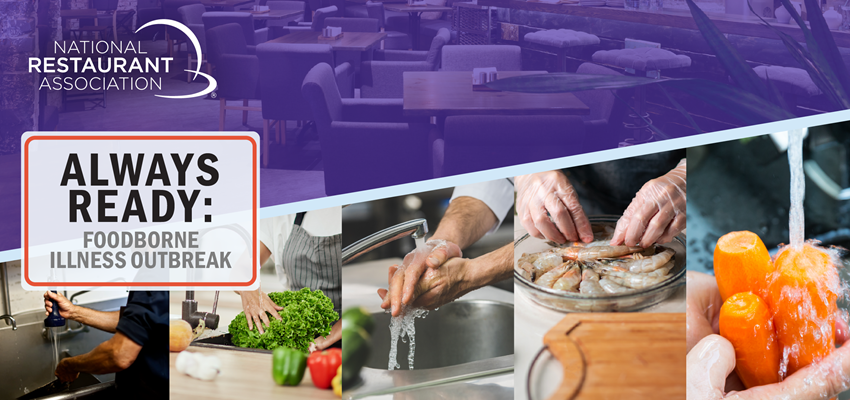September 18, 2024
Tips to prevent foodborne illness outbreaks
During National Food Safety Month’s week 3, ServSafe experts explore preventing the spread of pathogens at restaurants.

One of the most important personal hygiene practices food handlers should know is when, where and how to wash their hands.
Implementing proper prevention practices at your restaurant can significantly reduce the risk of contamination and foodborne illness.
Most outbreaks are caused by food handlers who unknowingly transfer pathogens from their bodies onto food. When you neglect personal hygiene—especially hand washing—you greatly increase that risk. Another common cause stems from unsafe food handling practices that allow harmful bacteria to grow in food, including storing, thawing, cooking, cooling, reheating and holding foods at improper temperatures.
The takeaways
NFSM’s week 3 materials provide tips to protect your staff and customers from a foodborne illness outbreak. They’ll also help keep your reputation safe, too.
Most outbreaks are caused by food handlers who unknowingly transfer pathogens from their bodies onto food. When you neglect personal hygiene—especially hand washing—you greatly increase that risk. Another common cause stems from unsafe food handling practices that allow harmful bacteria to grow in food, including storing, thawing, cooking, cooling, reheating and holding foods at improper temperatures.
The takeaways
NFSM’s week 3 materials provide tips to protect your staff and customers from a foodborne illness outbreak. They’ll also help keep your reputation safe, too.
- Ensure your staff are following proper hygiene protocols. One of the most important personal hygiene practices food handlers should follow is knowing when, where and how to wash their hands. They should also know when and how to use gloves, wear appropriate work attire, and not show up to work when sick.
- Minimizing the time foods spend in the temperature danger zone is critical for controlling the bacteria growth that can cause illness. Ensure your kitchen staff can identify time and temperature controls or TCS foods and can properly take food temperatures using a calibrated thermometer.
- Prevent cross contamination by keeping raw and ready-to-eat foods apart in storage, on the work top and in service to limit the transfer of pathogens.
- Establish good cleaning and sanitizing practices in the kitchen to eradicate harmful pathogens on work surfaces so they can’t spread to food. Make sure employees know when and how to clean and sanitize, how to use a dishwasher and 3-compartment sink, and properly handle garbage.
Supported by
-
Tork
![]() TorkThe Tork brand offers professional hygiene products and services to customers worldwide ranging from restaurants and healthcare facilities to offices, schools, and industries. Our products include dispensers, paper towels, toilet tissues, soap, napkins, and wipers, but also software solutions for data-driven cleaning. Through expertise in hygiene, functional design, and sustainability, Tork has become a market leader that supports customers to think ahead so they're always ready for business. Tork is a global brand of Essity and a committed partner to customers in over 110 countries. To keep up with the latest Tork news and innovations, please visit www.torkusa.com
TorkThe Tork brand offers professional hygiene products and services to customers worldwide ranging from restaurants and healthcare facilities to offices, schools, and industries. Our products include dispensers, paper towels, toilet tissues, soap, napkins, and wipers, but also software solutions for data-driven cleaning. Through expertise in hygiene, functional design, and sustainability, Tork has become a market leader that supports customers to think ahead so they're always ready for business. Tork is a global brand of Essity and a committed partner to customers in over 110 countries. To keep up with the latest Tork news and innovations, please visit www.torkusa.com
Get the report
Get the report
Sign up for our Newsletter
The latest news from the National Restaurant Association, published every other Thursday
By clicking Submit I agree to receive email communications from the National Restaurant Association and agree to our Privacy Policy(Opens in a new window).

